Analysis of Australian Political Discontent: An Essay
VerifiedAdded on 2022/11/12
|10
|2971
|128
Essay
AI Summary
This essay examines the complex relationship between Australians and their political system, exploring the notion that Australians harbor a dislike for politics. It delves into the historical context, highlighting the evolution of the Australian political landscape and its impact on public sentiment. The essay presents a comprehensive overview of the Australian government, including its structure and key institutions, while also analyzing the electoral system and its perceived effectiveness. It draws upon recent surveys and reports to assess public satisfaction with the democratic system, revealing a decline in trust and engagement. The essay explores the reasons behind this discontent, focusing on issues such as broken promises, lack of accountability, and the influence of special interests. Furthermore, it examines the public's desire for political reform, including preferences for greater transparency, citizen participation, and limitations on political donations. Ultimately, the essay concludes that while Australians may not necessarily hate democracy, they are deeply dissatisfied with the current state of politics and are seeking a more just, ethical, and responsive political system.
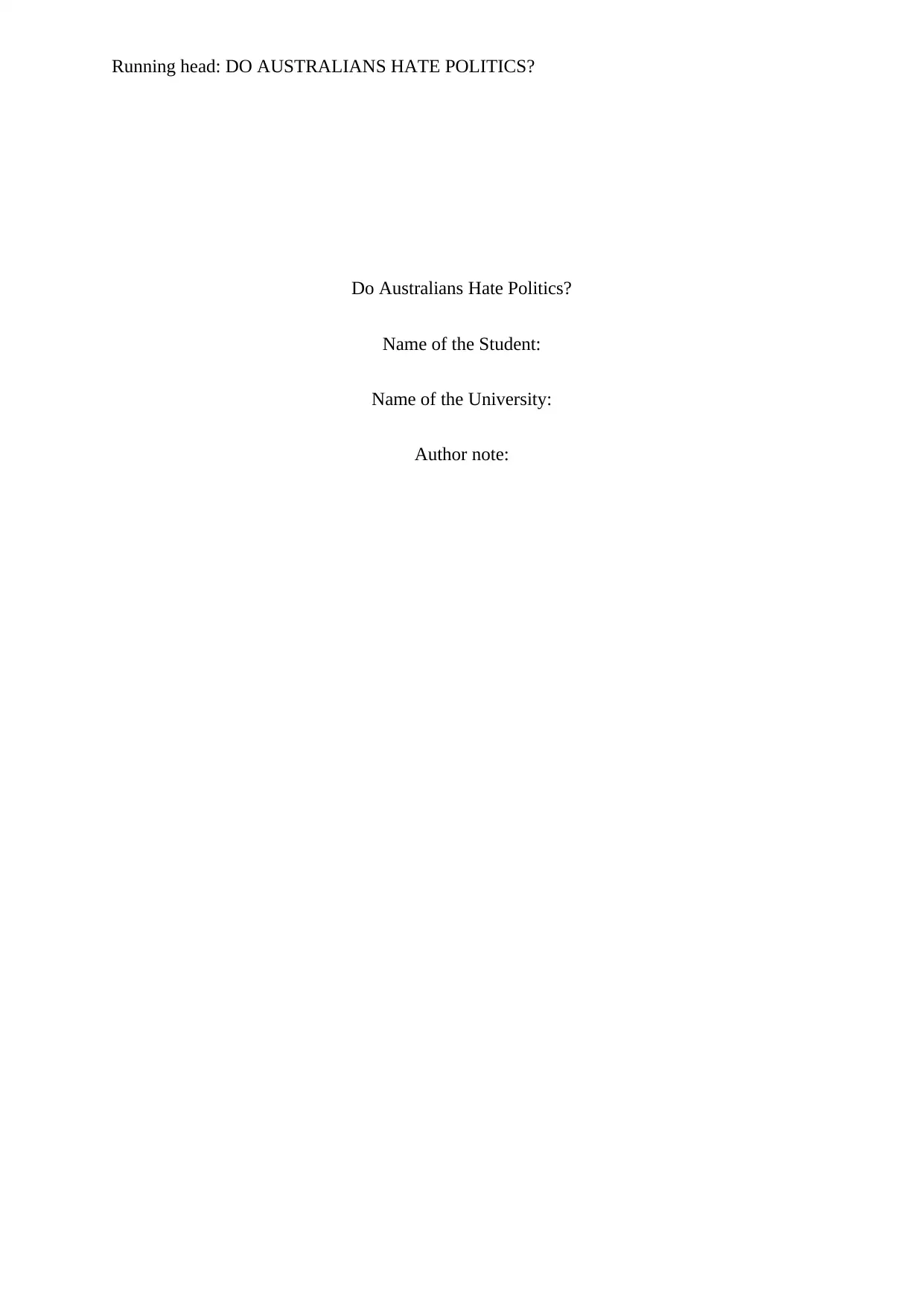
Running head: DO AUSTRALIANS HATE POLITICS?
Do Australians Hate Politics?
Name of the Student:
Name of the University:
Author note:
Do Australians Hate Politics?
Name of the Student:
Name of the University:
Author note:
Paraphrase This Document
Need a fresh take? Get an instant paraphrase of this document with our AI Paraphraser
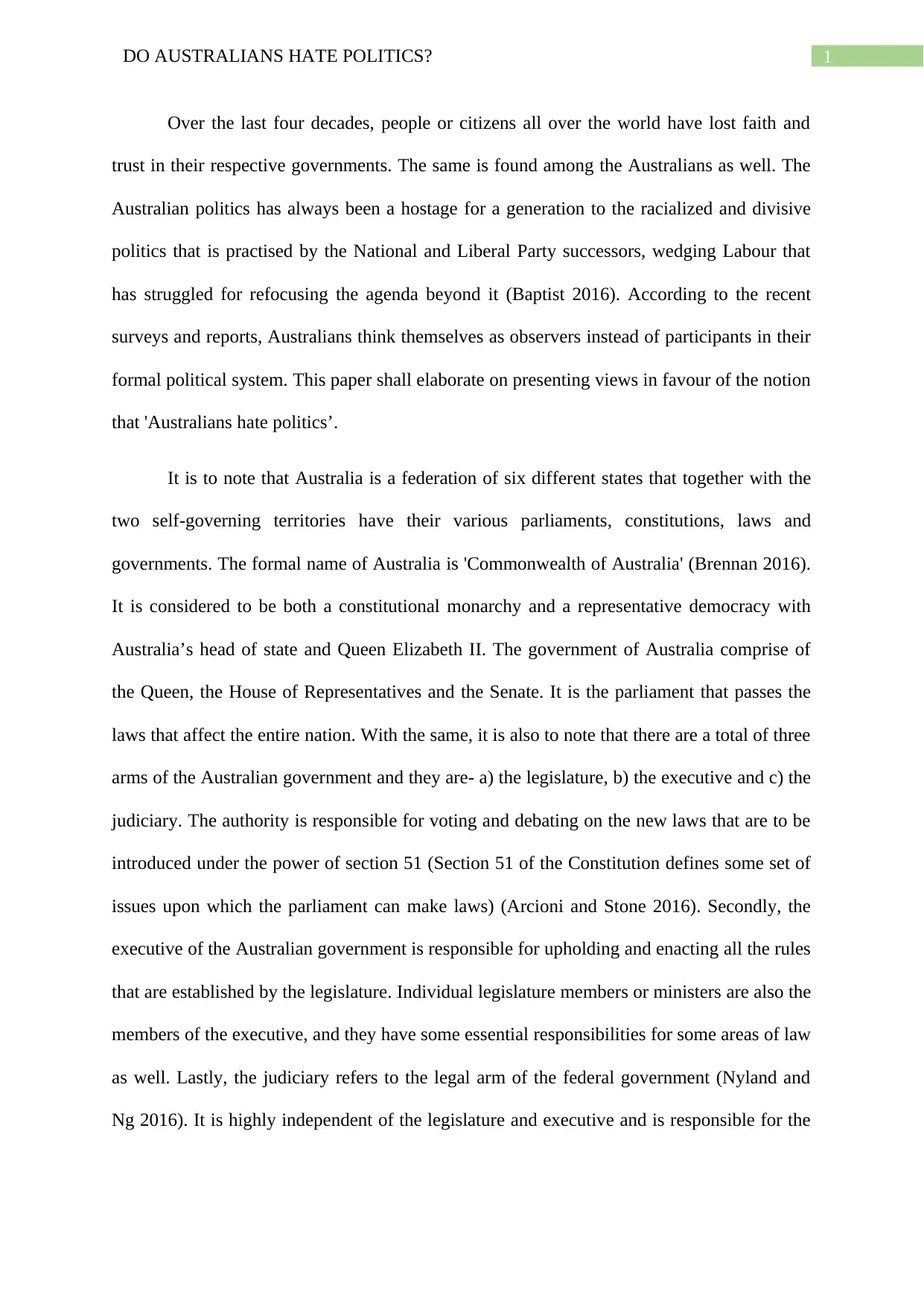
1DO AUSTRALIANS HATE POLITICS?
Over the last four decades, people or citizens all over the world have lost faith and
trust in their respective governments. The same is found among the Australians as well. The
Australian politics has always been a hostage for a generation to the racialized and divisive
politics that is practised by the National and Liberal Party successors, wedging Labour that
has struggled for refocusing the agenda beyond it (Baptist 2016). According to the recent
surveys and reports, Australians think themselves as observers instead of participants in their
formal political system. This paper shall elaborate on presenting views in favour of the notion
that 'Australians hate politics’.
It is to note that Australia is a federation of six different states that together with the
two self-governing territories have their various parliaments, constitutions, laws and
governments. The formal name of Australia is 'Commonwealth of Australia' (Brennan 2016).
It is considered to be both a constitutional monarchy and a representative democracy with
Australia’s head of state and Queen Elizabeth II. The government of Australia comprise of
the Queen, the House of Representatives and the Senate. It is the parliament that passes the
laws that affect the entire nation. With the same, it is also to note that there are a total of three
arms of the Australian government and they are- a) the legislature, b) the executive and c) the
judiciary. The authority is responsible for voting and debating on the new laws that are to be
introduced under the power of section 51 (Section 51 of the Constitution defines some set of
issues upon which the parliament can make laws) (Arcioni and Stone 2016). Secondly, the
executive of the Australian government is responsible for upholding and enacting all the rules
that are established by the legislature. Individual legislature members or ministers are also the
members of the executive, and they have some essential responsibilities for some areas of law
as well. Lastly, the judiciary refers to the legal arm of the federal government (Nyland and
Ng 2016). It is highly independent of the legislature and executive and is responsible for the
Over the last four decades, people or citizens all over the world have lost faith and
trust in their respective governments. The same is found among the Australians as well. The
Australian politics has always been a hostage for a generation to the racialized and divisive
politics that is practised by the National and Liberal Party successors, wedging Labour that
has struggled for refocusing the agenda beyond it (Baptist 2016). According to the recent
surveys and reports, Australians think themselves as observers instead of participants in their
formal political system. This paper shall elaborate on presenting views in favour of the notion
that 'Australians hate politics’.
It is to note that Australia is a federation of six different states that together with the
two self-governing territories have their various parliaments, constitutions, laws and
governments. The formal name of Australia is 'Commonwealth of Australia' (Brennan 2016).
It is considered to be both a constitutional monarchy and a representative democracy with
Australia’s head of state and Queen Elizabeth II. The government of Australia comprise of
the Queen, the House of Representatives and the Senate. It is the parliament that passes the
laws that affect the entire nation. With the same, it is also to note that there are a total of three
arms of the Australian government and they are- a) the legislature, b) the executive and c) the
judiciary. The authority is responsible for voting and debating on the new laws that are to be
introduced under the power of section 51 (Section 51 of the Constitution defines some set of
issues upon which the parliament can make laws) (Arcioni and Stone 2016). Secondly, the
executive of the Australian government is responsible for upholding and enacting all the rules
that are established by the legislature. Individual legislature members or ministers are also the
members of the executive, and they have some essential responsibilities for some areas of law
as well. Lastly, the judiciary refers to the legal arm of the federal government (Nyland and
Ng 2016). It is highly independent of the legislature and executive and is responsible for the
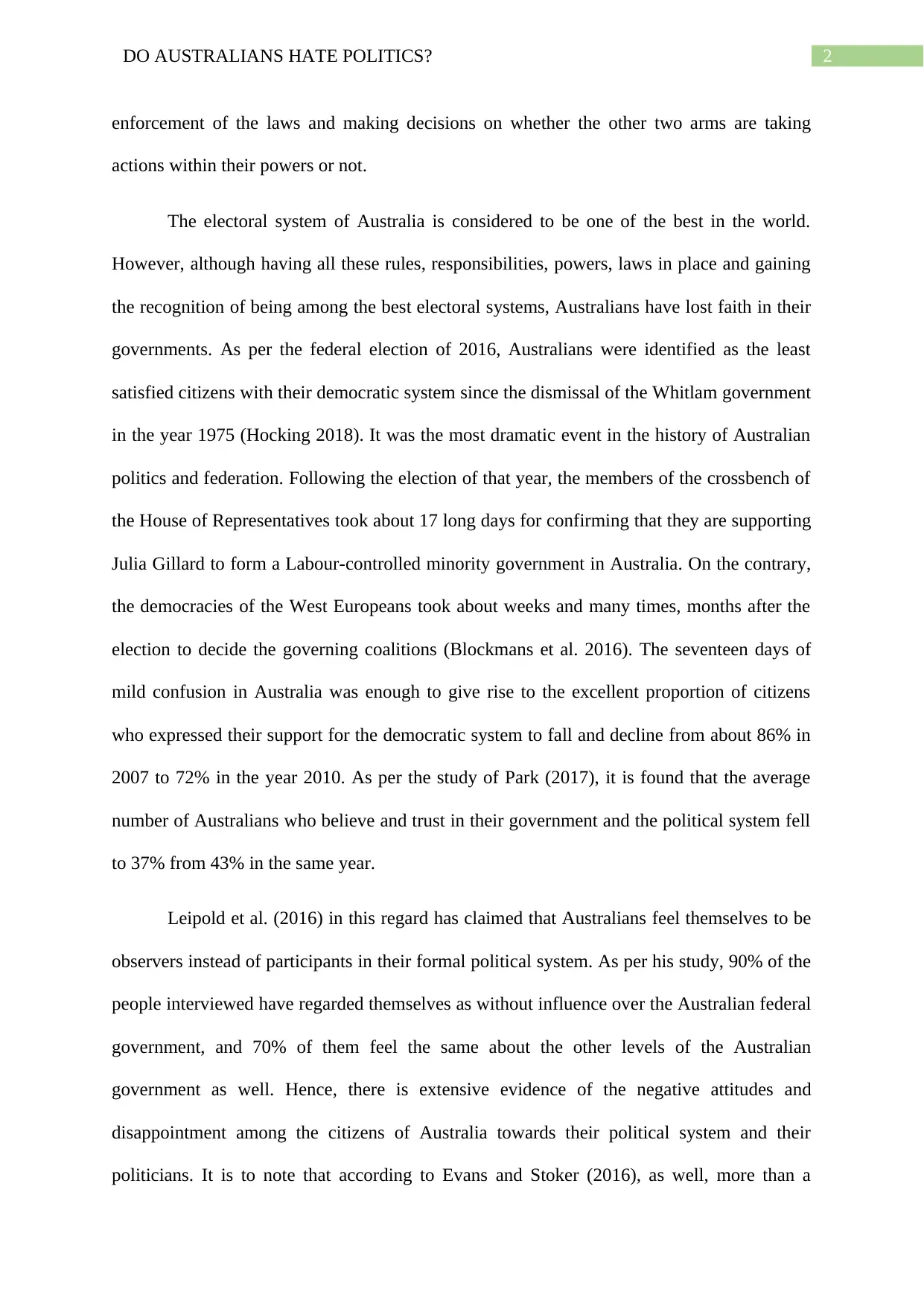
2DO AUSTRALIANS HATE POLITICS?
enforcement of the laws and making decisions on whether the other two arms are taking
actions within their powers or not.
The electoral system of Australia is considered to be one of the best in the world.
However, although having all these rules, responsibilities, powers, laws in place and gaining
the recognition of being among the best electoral systems, Australians have lost faith in their
governments. As per the federal election of 2016, Australians were identified as the least
satisfied citizens with their democratic system since the dismissal of the Whitlam government
in the year 1975 (Hocking 2018). It was the most dramatic event in the history of Australian
politics and federation. Following the election of that year, the members of the crossbench of
the House of Representatives took about 17 long days for confirming that they are supporting
Julia Gillard to form a Labour-controlled minority government in Australia. On the contrary,
the democracies of the West Europeans took about weeks and many times, months after the
election to decide the governing coalitions (Blockmans et al. 2016). The seventeen days of
mild confusion in Australia was enough to give rise to the excellent proportion of citizens
who expressed their support for the democratic system to fall and decline from about 86% in
2007 to 72% in the year 2010. As per the study of Park (2017), it is found that the average
number of Australians who believe and trust in their government and the political system fell
to 37% from 43% in the same year.
Leipold et al. (2016) in this regard has claimed that Australians feel themselves to be
observers instead of participants in their formal political system. As per his study, 90% of the
people interviewed have regarded themselves as without influence over the Australian federal
government, and 70% of them feel the same about the other levels of the Australian
government as well. Hence, there is extensive evidence of the negative attitudes and
disappointment among the citizens of Australia towards their political system and their
politicians. It is to note that according to Evans and Stoker (2016), as well, more than a
enforcement of the laws and making decisions on whether the other two arms are taking
actions within their powers or not.
The electoral system of Australia is considered to be one of the best in the world.
However, although having all these rules, responsibilities, powers, laws in place and gaining
the recognition of being among the best electoral systems, Australians have lost faith in their
governments. As per the federal election of 2016, Australians were identified as the least
satisfied citizens with their democratic system since the dismissal of the Whitlam government
in the year 1975 (Hocking 2018). It was the most dramatic event in the history of Australian
politics and federation. Following the election of that year, the members of the crossbench of
the House of Representatives took about 17 long days for confirming that they are supporting
Julia Gillard to form a Labour-controlled minority government in Australia. On the contrary,
the democracies of the West Europeans took about weeks and many times, months after the
election to decide the governing coalitions (Blockmans et al. 2016). The seventeen days of
mild confusion in Australia was enough to give rise to the excellent proportion of citizens
who expressed their support for the democratic system to fall and decline from about 86% in
2007 to 72% in the year 2010. As per the study of Park (2017), it is found that the average
number of Australians who believe and trust in their government and the political system fell
to 37% from 43% in the same year.
Leipold et al. (2016) in this regard has claimed that Australians feel themselves to be
observers instead of participants in their formal political system. As per his study, 90% of the
people interviewed have regarded themselves as without influence over the Australian federal
government, and 70% of them feel the same about the other levels of the Australian
government as well. Hence, there is extensive evidence of the negative attitudes and
disappointment among the citizens of Australia towards their political system and their
politicians. It is to note that according to Evans and Stoker (2016), as well, more than a
⊘ This is a preview!⊘
Do you want full access?
Subscribe today to unlock all pages.

Trusted by 1+ million students worldwide
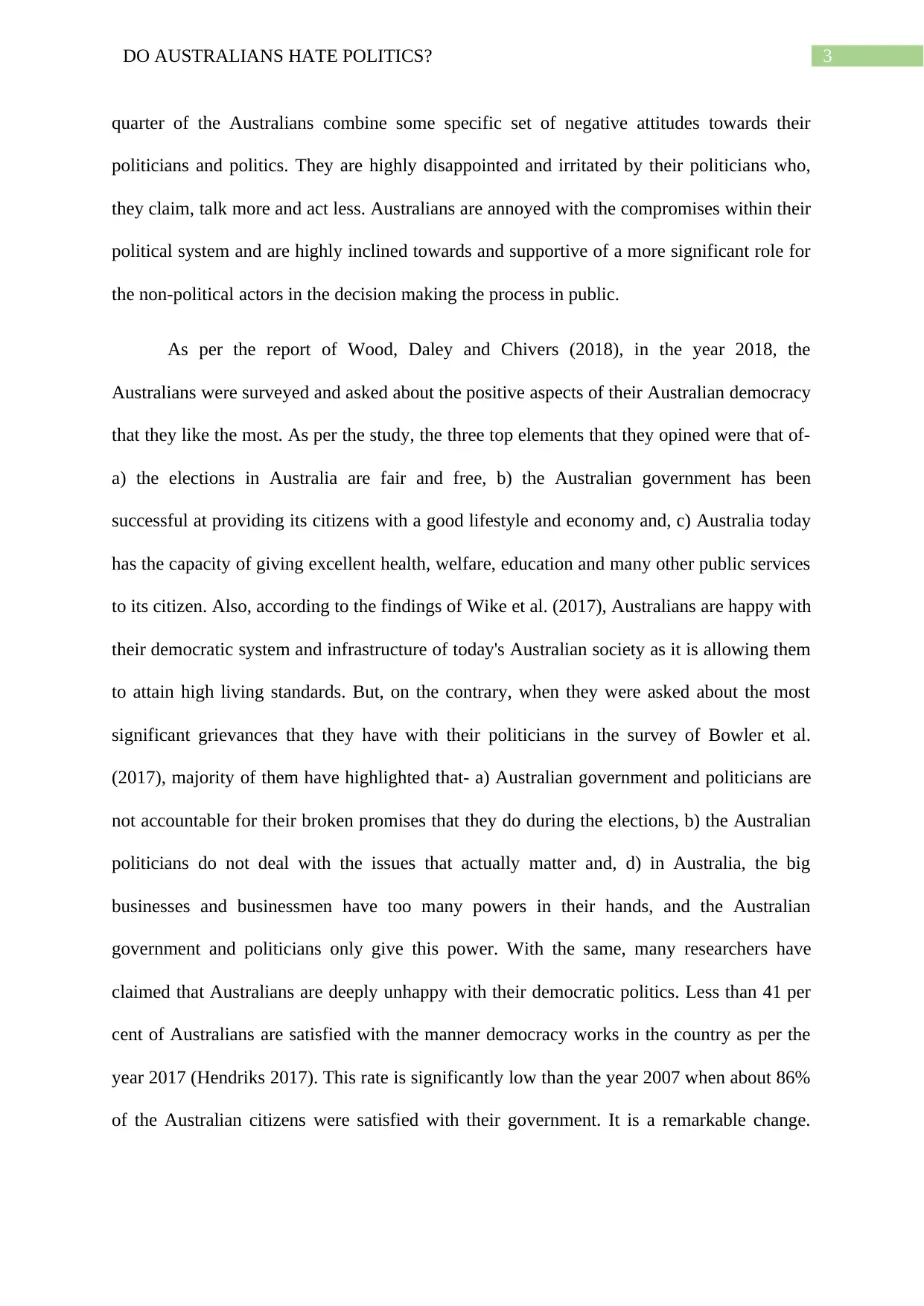
3DO AUSTRALIANS HATE POLITICS?
quarter of the Australians combine some specific set of negative attitudes towards their
politicians and politics. They are highly disappointed and irritated by their politicians who,
they claim, talk more and act less. Australians are annoyed with the compromises within their
political system and are highly inclined towards and supportive of a more significant role for
the non-political actors in the decision making the process in public.
As per the report of Wood, Daley and Chivers (2018), in the year 2018, the
Australians were surveyed and asked about the positive aspects of their Australian democracy
that they like the most. As per the study, the three top elements that they opined were that of-
a) the elections in Australia are fair and free, b) the Australian government has been
successful at providing its citizens with a good lifestyle and economy and, c) Australia today
has the capacity of giving excellent health, welfare, education and many other public services
to its citizen. Also, according to the findings of Wike et al. (2017), Australians are happy with
their democratic system and infrastructure of today's Australian society as it is allowing them
to attain high living standards. But, on the contrary, when they were asked about the most
significant grievances that they have with their politicians in the survey of Bowler et al.
(2017), majority of them have highlighted that- a) Australian government and politicians are
not accountable for their broken promises that they do during the elections, b) the Australian
politicians do not deal with the issues that actually matter and, d) in Australia, the big
businesses and businessmen have too many powers in their hands, and the Australian
government and politicians only give this power. With the same, many researchers have
claimed that Australians are deeply unhappy with their democratic politics. Less than 41 per
cent of Australians are satisfied with the manner democracy works in the country as per the
year 2017 (Hendriks 2017). This rate is significantly low than the year 2007 when about 86%
of the Australian citizens were satisfied with their government. It is a remarkable change.
quarter of the Australians combine some specific set of negative attitudes towards their
politicians and politics. They are highly disappointed and irritated by their politicians who,
they claim, talk more and act less. Australians are annoyed with the compromises within their
political system and are highly inclined towards and supportive of a more significant role for
the non-political actors in the decision making the process in public.
As per the report of Wood, Daley and Chivers (2018), in the year 2018, the
Australians were surveyed and asked about the positive aspects of their Australian democracy
that they like the most. As per the study, the three top elements that they opined were that of-
a) the elections in Australia are fair and free, b) the Australian government has been
successful at providing its citizens with a good lifestyle and economy and, c) Australia today
has the capacity of giving excellent health, welfare, education and many other public services
to its citizen. Also, according to the findings of Wike et al. (2017), Australians are happy with
their democratic system and infrastructure of today's Australian society as it is allowing them
to attain high living standards. But, on the contrary, when they were asked about the most
significant grievances that they have with their politicians in the survey of Bowler et al.
(2017), majority of them have highlighted that- a) Australian government and politicians are
not accountable for their broken promises that they do during the elections, b) the Australian
politicians do not deal with the issues that actually matter and, d) in Australia, the big
businesses and businessmen have too many powers in their hands, and the Australian
government and politicians only give this power. With the same, many researchers have
claimed that Australians are deeply unhappy with their democratic politics. Less than 41 per
cent of Australians are satisfied with the manner democracy works in the country as per the
year 2017 (Hendriks 2017). This rate is significantly low than the year 2007 when about 86%
of the Australian citizens were satisfied with their government. It is a remarkable change.
Paraphrase This Document
Need a fresh take? Get an instant paraphrase of this document with our AI Paraphraser
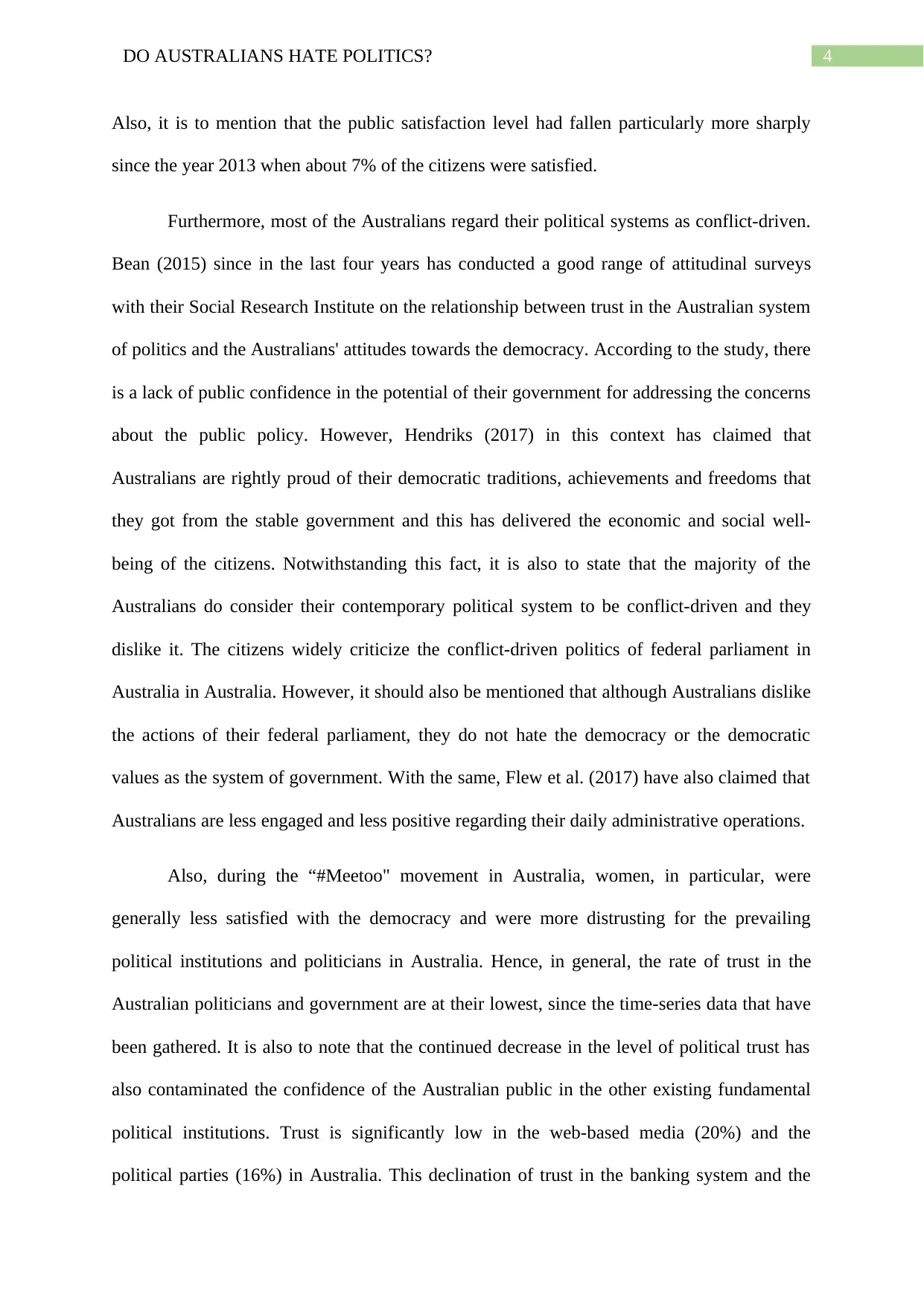
4DO AUSTRALIANS HATE POLITICS?
Also, it is to mention that the public satisfaction level had fallen particularly more sharply
since the year 2013 when about 7% of the citizens were satisfied.
Furthermore, most of the Australians regard their political systems as conflict-driven.
Bean (2015) since in the last four years has conducted a good range of attitudinal surveys
with their Social Research Institute on the relationship between trust in the Australian system
of politics and the Australians' attitudes towards the democracy. According to the study, there
is a lack of public confidence in the potential of their government for addressing the concerns
about the public policy. However, Hendriks (2017) in this context has claimed that
Australians are rightly proud of their democratic traditions, achievements and freedoms that
they got from the stable government and this has delivered the economic and social well-
being of the citizens. Notwithstanding this fact, it is also to state that the majority of the
Australians do consider their contemporary political system to be conflict-driven and they
dislike it. The citizens widely criticize the conflict-driven politics of federal parliament in
Australia in Australia. However, it should also be mentioned that although Australians dislike
the actions of their federal parliament, they do not hate the democracy or the democratic
values as the system of government. With the same, Flew et al. (2017) have also claimed that
Australians are less engaged and less positive regarding their daily administrative operations.
Also, during the “#Meetoo" movement in Australia, women, in particular, were
generally less satisfied with the democracy and were more distrusting for the prevailing
political institutions and politicians in Australia. Hence, in general, the rate of trust in the
Australian politicians and government are at their lowest, since the time-series data that have
been gathered. It is also to note that the continued decrease in the level of political trust has
also contaminated the confidence of the Australian public in the other existing fundamental
political institutions. Trust is significantly low in the web-based media (20%) and the
political parties (16%) in Australia. This declination of trust in the banking system and the
Also, it is to mention that the public satisfaction level had fallen particularly more sharply
since the year 2013 when about 7% of the citizens were satisfied.
Furthermore, most of the Australians regard their political systems as conflict-driven.
Bean (2015) since in the last four years has conducted a good range of attitudinal surveys
with their Social Research Institute on the relationship between trust in the Australian system
of politics and the Australians' attitudes towards the democracy. According to the study, there
is a lack of public confidence in the potential of their government for addressing the concerns
about the public policy. However, Hendriks (2017) in this context has claimed that
Australians are rightly proud of their democratic traditions, achievements and freedoms that
they got from the stable government and this has delivered the economic and social well-
being of the citizens. Notwithstanding this fact, it is also to state that the majority of the
Australians do consider their contemporary political system to be conflict-driven and they
dislike it. The citizens widely criticize the conflict-driven politics of federal parliament in
Australia in Australia. However, it should also be mentioned that although Australians dislike
the actions of their federal parliament, they do not hate the democracy or the democratic
values as the system of government. With the same, Flew et al. (2017) have also claimed that
Australians are less engaged and less positive regarding their daily administrative operations.
Also, during the “#Meetoo" movement in Australia, women, in particular, were
generally less satisfied with the democracy and were more distrusting for the prevailing
political institutions and politicians in Australia. Hence, in general, the rate of trust in the
Australian politicians and government are at their lowest, since the time-series data that have
been gathered. It is also to note that the continued decrease in the level of political trust has
also contaminated the confidence of the Australian public in the other existing fundamental
political institutions. Trust is significantly low in the web-based media (20%) and the
political parties (16%) in Australia. This declination of trust in the banking system and the
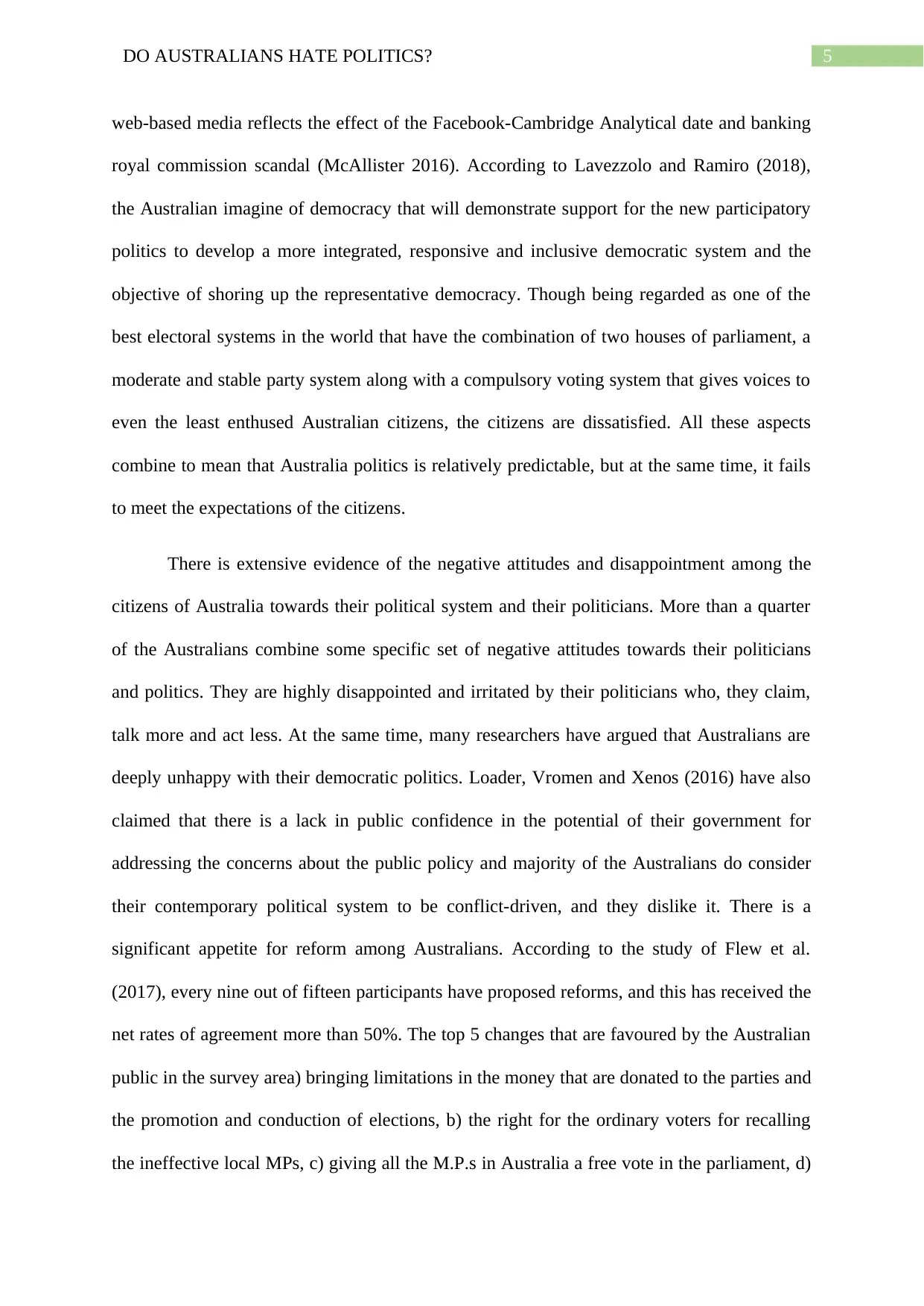
5DO AUSTRALIANS HATE POLITICS?
web-based media reflects the effect of the Facebook-Cambridge Analytical date and banking
royal commission scandal (McAllister 2016). According to Lavezzolo and Ramiro (2018),
the Australian imagine of democracy that will demonstrate support for the new participatory
politics to develop a more integrated, responsive and inclusive democratic system and the
objective of shoring up the representative democracy. Though being regarded as one of the
best electoral systems in the world that have the combination of two houses of parliament, a
moderate and stable party system along with a compulsory voting system that gives voices to
even the least enthused Australian citizens, the citizens are dissatisfied. All these aspects
combine to mean that Australia politics is relatively predictable, but at the same time, it fails
to meet the expectations of the citizens.
There is extensive evidence of the negative attitudes and disappointment among the
citizens of Australia towards their political system and their politicians. More than a quarter
of the Australians combine some specific set of negative attitudes towards their politicians
and politics. They are highly disappointed and irritated by their politicians who, they claim,
talk more and act less. At the same time, many researchers have argued that Australians are
deeply unhappy with their democratic politics. Loader, Vromen and Xenos (2016) have also
claimed that there is a lack in public confidence in the potential of their government for
addressing the concerns about the public policy and majority of the Australians do consider
their contemporary political system to be conflict-driven, and they dislike it. There is a
significant appetite for reform among Australians. According to the study of Flew et al.
(2017), every nine out of fifteen participants have proposed reforms, and this has received the
net rates of agreement more than 50%. The top 5 changes that are favoured by the Australian
public in the survey area) bringing limitations in the money that are donated to the parties and
the promotion and conduction of elections, b) the right for the ordinary voters for recalling
the ineffective local MPs, c) giving all the M.P.s in Australia a free vote in the parliament, d)
web-based media reflects the effect of the Facebook-Cambridge Analytical date and banking
royal commission scandal (McAllister 2016). According to Lavezzolo and Ramiro (2018),
the Australian imagine of democracy that will demonstrate support for the new participatory
politics to develop a more integrated, responsive and inclusive democratic system and the
objective of shoring up the representative democracy. Though being regarded as one of the
best electoral systems in the world that have the combination of two houses of parliament, a
moderate and stable party system along with a compulsory voting system that gives voices to
even the least enthused Australian citizens, the citizens are dissatisfied. All these aspects
combine to mean that Australia politics is relatively predictable, but at the same time, it fails
to meet the expectations of the citizens.
There is extensive evidence of the negative attitudes and disappointment among the
citizens of Australia towards their political system and their politicians. More than a quarter
of the Australians combine some specific set of negative attitudes towards their politicians
and politics. They are highly disappointed and irritated by their politicians who, they claim,
talk more and act less. At the same time, many researchers have argued that Australians are
deeply unhappy with their democratic politics. Loader, Vromen and Xenos (2016) have also
claimed that there is a lack in public confidence in the potential of their government for
addressing the concerns about the public policy and majority of the Australians do consider
their contemporary political system to be conflict-driven, and they dislike it. There is a
significant appetite for reform among Australians. According to the study of Flew et al.
(2017), every nine out of fifteen participants have proposed reforms, and this has received the
net rates of agreement more than 50%. The top 5 changes that are favoured by the Australian
public in the survey area) bringing limitations in the money that are donated to the parties and
the promotion and conduction of elections, b) the right for the ordinary voters for recalling
the ineffective local MPs, c) giving all the M.P.s in Australia a free vote in the parliament, d)
⊘ This is a preview!⊘
Do you want full access?
Subscribe today to unlock all pages.

Trusted by 1+ million students worldwide
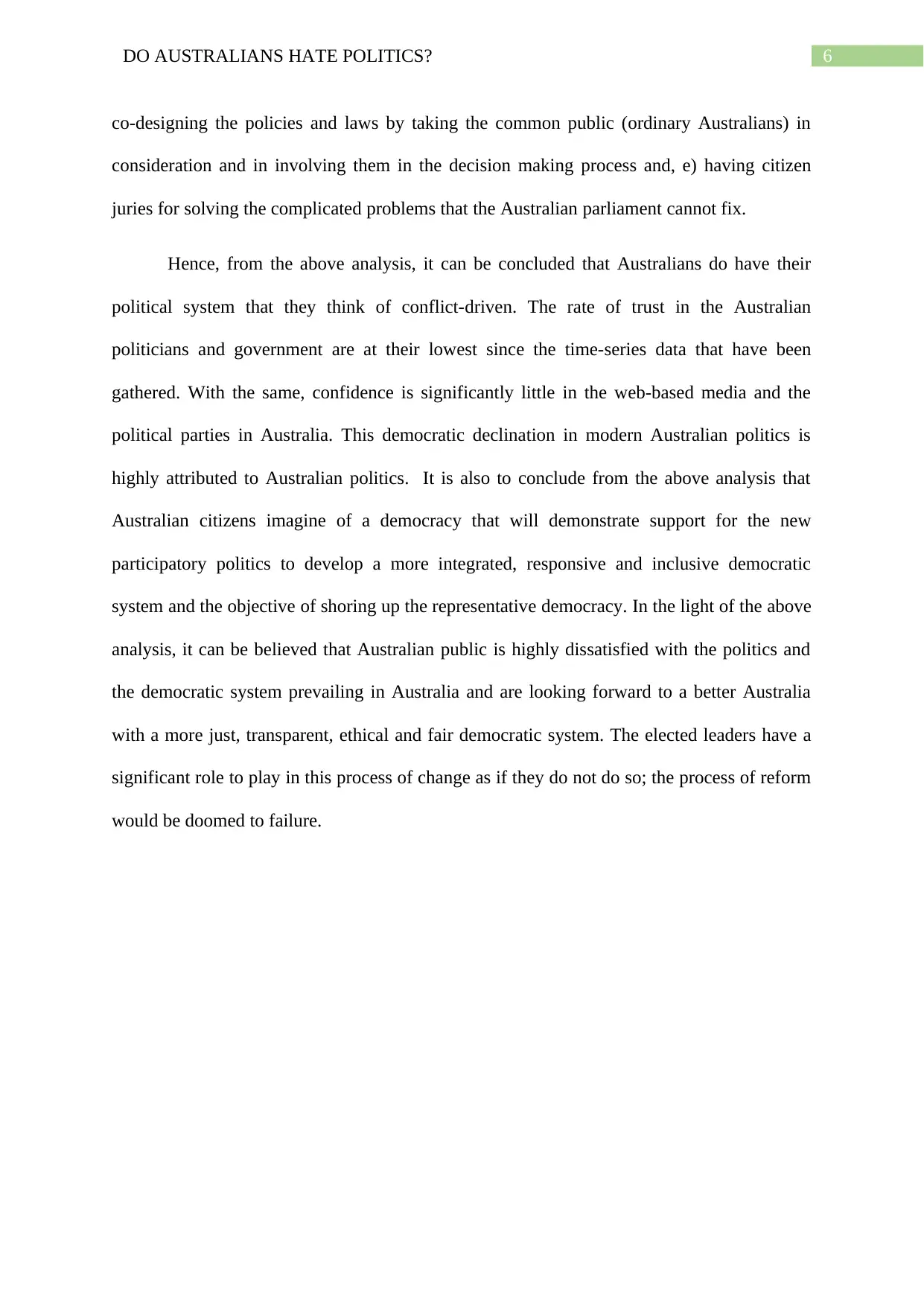
6DO AUSTRALIANS HATE POLITICS?
co-designing the policies and laws by taking the common public (ordinary Australians) in
consideration and in involving them in the decision making process and, e) having citizen
juries for solving the complicated problems that the Australian parliament cannot fix.
Hence, from the above analysis, it can be concluded that Australians do have their
political system that they think of conflict-driven. The rate of trust in the Australian
politicians and government are at their lowest since the time-series data that have been
gathered. With the same, confidence is significantly little in the web-based media and the
political parties in Australia. This democratic declination in modern Australian politics is
highly attributed to Australian politics. It is also to conclude from the above analysis that
Australian citizens imagine of a democracy that will demonstrate support for the new
participatory politics to develop a more integrated, responsive and inclusive democratic
system and the objective of shoring up the representative democracy. In the light of the above
analysis, it can be believed that Australian public is highly dissatisfied with the politics and
the democratic system prevailing in Australia and are looking forward to a better Australia
with a more just, transparent, ethical and fair democratic system. The elected leaders have a
significant role to play in this process of change as if they do not do so; the process of reform
would be doomed to failure.
co-designing the policies and laws by taking the common public (ordinary Australians) in
consideration and in involving them in the decision making process and, e) having citizen
juries for solving the complicated problems that the Australian parliament cannot fix.
Hence, from the above analysis, it can be concluded that Australians do have their
political system that they think of conflict-driven. The rate of trust in the Australian
politicians and government are at their lowest since the time-series data that have been
gathered. With the same, confidence is significantly little in the web-based media and the
political parties in Australia. This democratic declination in modern Australian politics is
highly attributed to Australian politics. It is also to conclude from the above analysis that
Australian citizens imagine of a democracy that will demonstrate support for the new
participatory politics to develop a more integrated, responsive and inclusive democratic
system and the objective of shoring up the representative democracy. In the light of the above
analysis, it can be believed that Australian public is highly dissatisfied with the politics and
the democratic system prevailing in Australia and are looking forward to a better Australia
with a more just, transparent, ethical and fair democratic system. The elected leaders have a
significant role to play in this process of change as if they do not do so; the process of reform
would be doomed to failure.
Paraphrase This Document
Need a fresh take? Get an instant paraphrase of this document with our AI Paraphraser
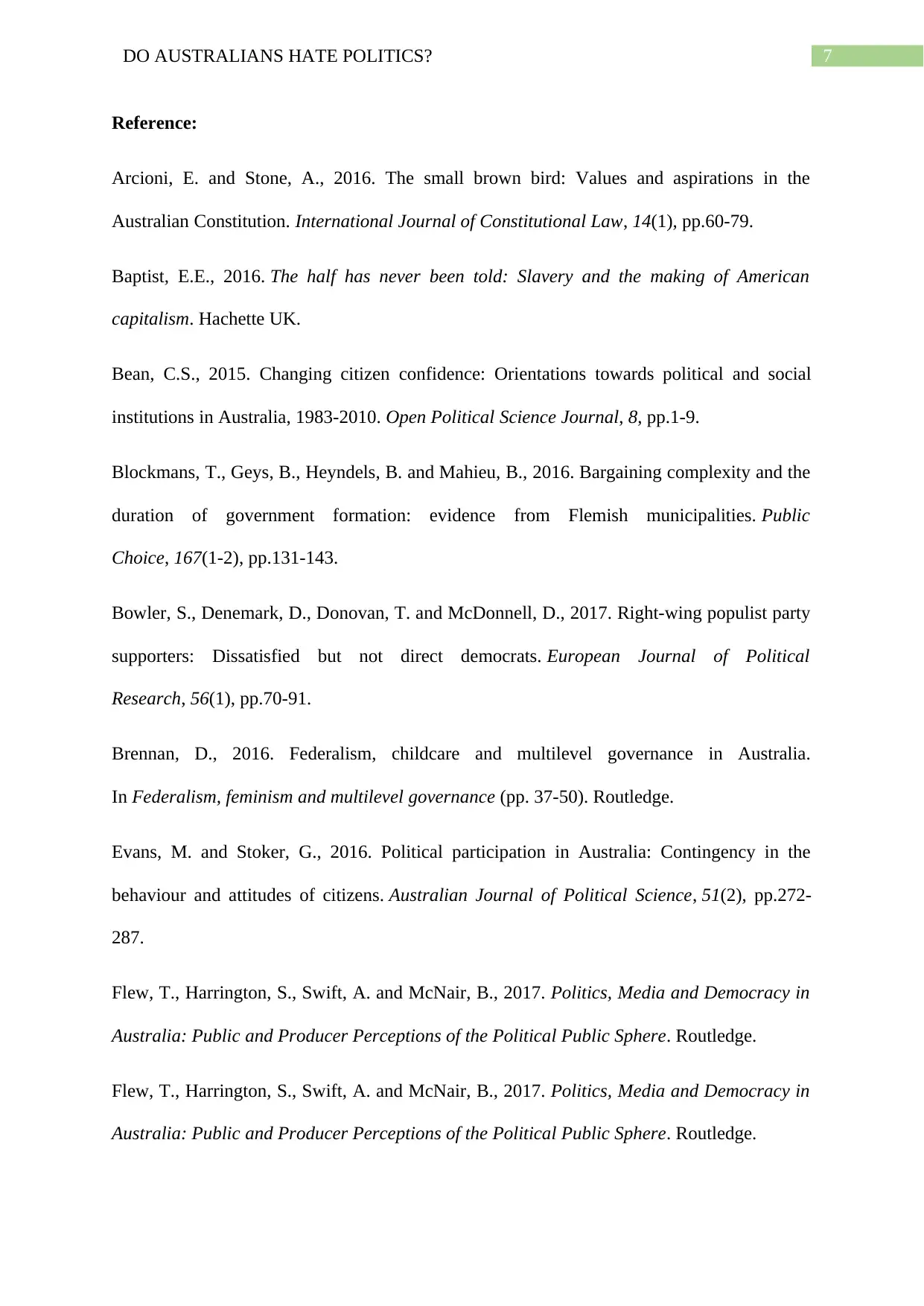
7DO AUSTRALIANS HATE POLITICS?
Reference:
Arcioni, E. and Stone, A., 2016. The small brown bird: Values and aspirations in the
Australian Constitution. International Journal of Constitutional Law, 14(1), pp.60-79.
Baptist, E.E., 2016. The half has never been told: Slavery and the making of American
capitalism. Hachette UK.
Bean, C.S., 2015. Changing citizen confidence: Orientations towards political and social
institutions in Australia, 1983-2010. Open Political Science Journal, 8, pp.1-9.
Blockmans, T., Geys, B., Heyndels, B. and Mahieu, B., 2016. Bargaining complexity and the
duration of government formation: evidence from Flemish municipalities. Public
Choice, 167(1-2), pp.131-143.
Bowler, S., Denemark, D., Donovan, T. and McDonnell, D., 2017. Right‐wing populist party
supporters: Dissatisfied but not direct democrats. European Journal of Political
Research, 56(1), pp.70-91.
Brennan, D., 2016. Federalism, childcare and multilevel governance in Australia.
In Federalism, feminism and multilevel governance (pp. 37-50). Routledge.
Evans, M. and Stoker, G., 2016. Political participation in Australia: Contingency in the
behaviour and attitudes of citizens. Australian Journal of Political Science, 51(2), pp.272-
287.
Flew, T., Harrington, S., Swift, A. and McNair, B., 2017. Politics, Media and Democracy in
Australia: Public and Producer Perceptions of the Political Public Sphere. Routledge.
Flew, T., Harrington, S., Swift, A. and McNair, B., 2017. Politics, Media and Democracy in
Australia: Public and Producer Perceptions of the Political Public Sphere. Routledge.
Reference:
Arcioni, E. and Stone, A., 2016. The small brown bird: Values and aspirations in the
Australian Constitution. International Journal of Constitutional Law, 14(1), pp.60-79.
Baptist, E.E., 2016. The half has never been told: Slavery and the making of American
capitalism. Hachette UK.
Bean, C.S., 2015. Changing citizen confidence: Orientations towards political and social
institutions in Australia, 1983-2010. Open Political Science Journal, 8, pp.1-9.
Blockmans, T., Geys, B., Heyndels, B. and Mahieu, B., 2016. Bargaining complexity and the
duration of government formation: evidence from Flemish municipalities. Public
Choice, 167(1-2), pp.131-143.
Bowler, S., Denemark, D., Donovan, T. and McDonnell, D., 2017. Right‐wing populist party
supporters: Dissatisfied but not direct democrats. European Journal of Political
Research, 56(1), pp.70-91.
Brennan, D., 2016. Federalism, childcare and multilevel governance in Australia.
In Federalism, feminism and multilevel governance (pp. 37-50). Routledge.
Evans, M. and Stoker, G., 2016. Political participation in Australia: Contingency in the
behaviour and attitudes of citizens. Australian Journal of Political Science, 51(2), pp.272-
287.
Flew, T., Harrington, S., Swift, A. and McNair, B., 2017. Politics, Media and Democracy in
Australia: Public and Producer Perceptions of the Political Public Sphere. Routledge.
Flew, T., Harrington, S., Swift, A. and McNair, B., 2017. Politics, Media and Democracy in
Australia: Public and Producer Perceptions of the Political Public Sphere. Routledge.
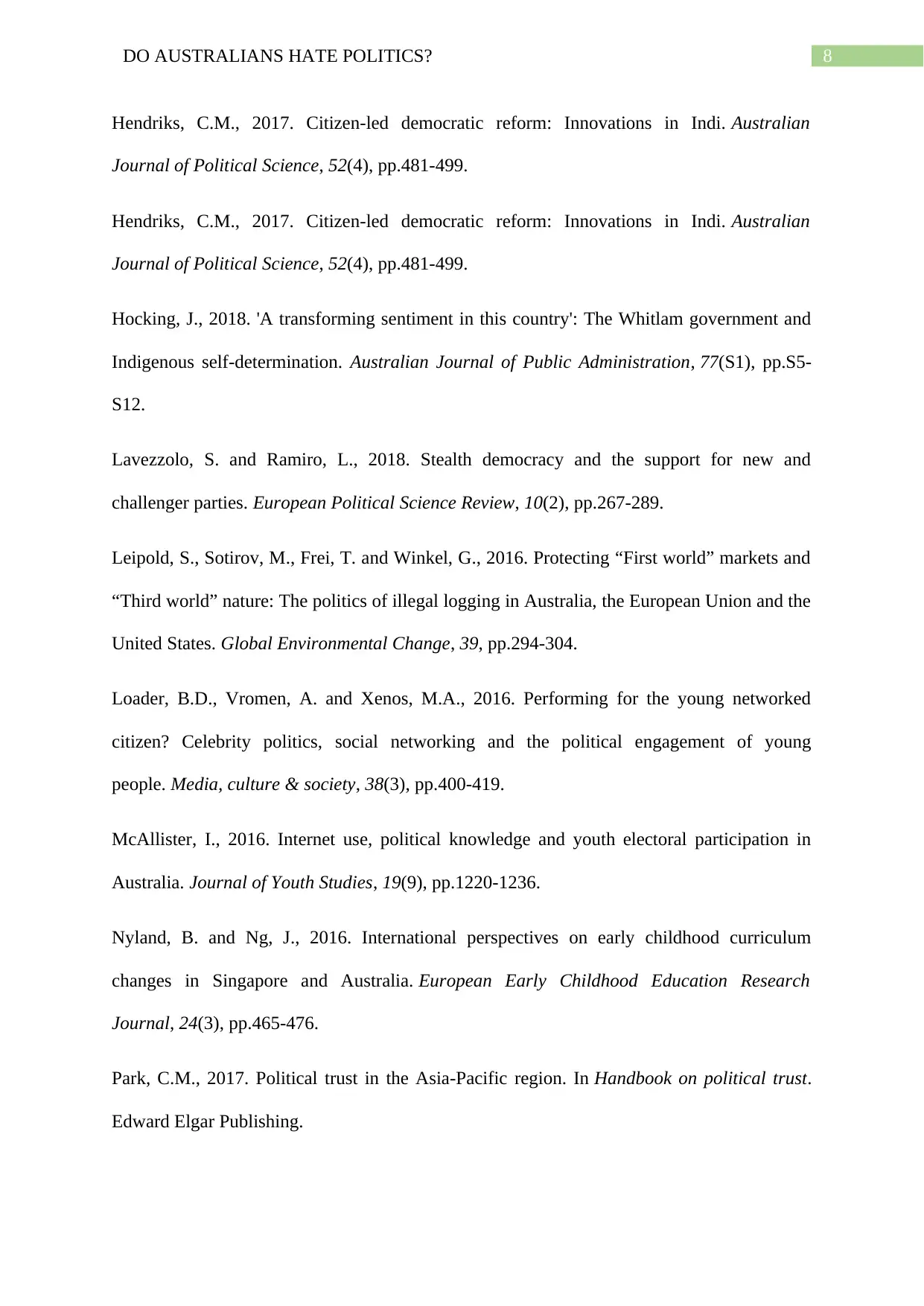
8DO AUSTRALIANS HATE POLITICS?
Hendriks, C.M., 2017. Citizen-led democratic reform: Innovations in Indi. Australian
Journal of Political Science, 52(4), pp.481-499.
Hendriks, C.M., 2017. Citizen-led democratic reform: Innovations in Indi. Australian
Journal of Political Science, 52(4), pp.481-499.
Hocking, J., 2018. 'A transforming sentiment in this country': The Whitlam government and
Indigenous self‐determination. Australian Journal of Public Administration, 77(S1), pp.S5-
S12.
Lavezzolo, S. and Ramiro, L., 2018. Stealth democracy and the support for new and
challenger parties. European Political Science Review, 10(2), pp.267-289.
Leipold, S., Sotirov, M., Frei, T. and Winkel, G., 2016. Protecting “First world” markets and
“Third world” nature: The politics of illegal logging in Australia, the European Union and the
United States. Global Environmental Change, 39, pp.294-304.
Loader, B.D., Vromen, A. and Xenos, M.A., 2016. Performing for the young networked
citizen? Celebrity politics, social networking and the political engagement of young
people. Media, culture & society, 38(3), pp.400-419.
McAllister, I., 2016. Internet use, political knowledge and youth electoral participation in
Australia. Journal of Youth Studies, 19(9), pp.1220-1236.
Nyland, B. and Ng, J., 2016. International perspectives on early childhood curriculum
changes in Singapore and Australia. European Early Childhood Education Research
Journal, 24(3), pp.465-476.
Park, C.M., 2017. Political trust in the Asia-Pacific region. In Handbook on political trust.
Edward Elgar Publishing.
Hendriks, C.M., 2017. Citizen-led democratic reform: Innovations in Indi. Australian
Journal of Political Science, 52(4), pp.481-499.
Hendriks, C.M., 2017. Citizen-led democratic reform: Innovations in Indi. Australian
Journal of Political Science, 52(4), pp.481-499.
Hocking, J., 2018. 'A transforming sentiment in this country': The Whitlam government and
Indigenous self‐determination. Australian Journal of Public Administration, 77(S1), pp.S5-
S12.
Lavezzolo, S. and Ramiro, L., 2018. Stealth democracy and the support for new and
challenger parties. European Political Science Review, 10(2), pp.267-289.
Leipold, S., Sotirov, M., Frei, T. and Winkel, G., 2016. Protecting “First world” markets and
“Third world” nature: The politics of illegal logging in Australia, the European Union and the
United States. Global Environmental Change, 39, pp.294-304.
Loader, B.D., Vromen, A. and Xenos, M.A., 2016. Performing for the young networked
citizen? Celebrity politics, social networking and the political engagement of young
people. Media, culture & society, 38(3), pp.400-419.
McAllister, I., 2016. Internet use, political knowledge and youth electoral participation in
Australia. Journal of Youth Studies, 19(9), pp.1220-1236.
Nyland, B. and Ng, J., 2016. International perspectives on early childhood curriculum
changes in Singapore and Australia. European Early Childhood Education Research
Journal, 24(3), pp.465-476.
Park, C.M., 2017. Political trust in the Asia-Pacific region. In Handbook on political trust.
Edward Elgar Publishing.
⊘ This is a preview!⊘
Do you want full access?
Subscribe today to unlock all pages.

Trusted by 1+ million students worldwide
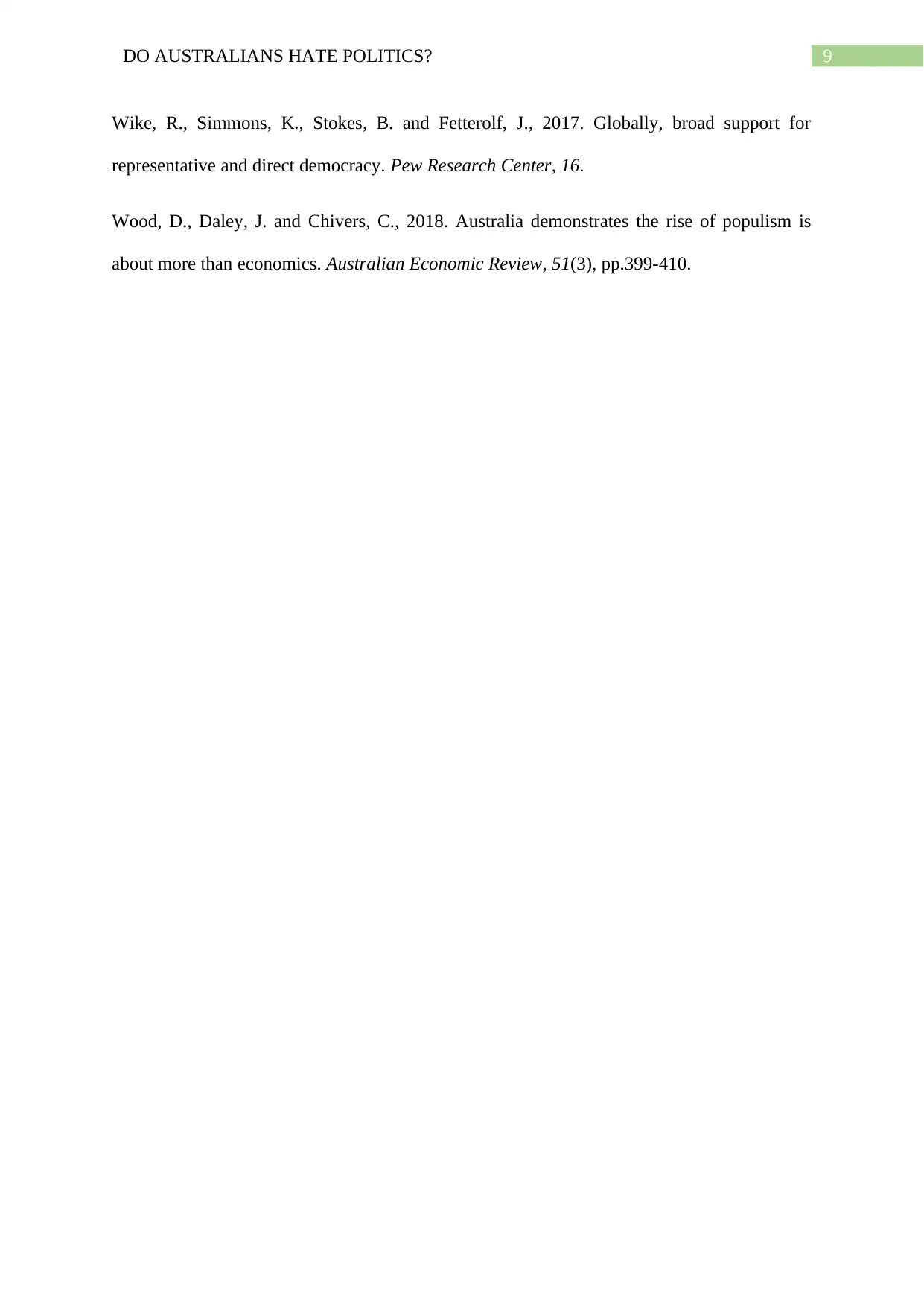
9DO AUSTRALIANS HATE POLITICS?
Wike, R., Simmons, K., Stokes, B. and Fetterolf, J., 2017. Globally, broad support for
representative and direct democracy. Pew Research Center, 16.
Wood, D., Daley, J. and Chivers, C., 2018. Australia demonstrates the rise of populism is
about more than economics. Australian Economic Review, 51(3), pp.399-410.
Wike, R., Simmons, K., Stokes, B. and Fetterolf, J., 2017. Globally, broad support for
representative and direct democracy. Pew Research Center, 16.
Wood, D., Daley, J. and Chivers, C., 2018. Australia demonstrates the rise of populism is
about more than economics. Australian Economic Review, 51(3), pp.399-410.
1 out of 10
Related Documents
Your All-in-One AI-Powered Toolkit for Academic Success.
+13062052269
info@desklib.com
Available 24*7 on WhatsApp / Email
![[object Object]](/_next/static/media/star-bottom.7253800d.svg)
Unlock your academic potential
Copyright © 2020–2026 A2Z Services. All Rights Reserved. Developed and managed by ZUCOL.





